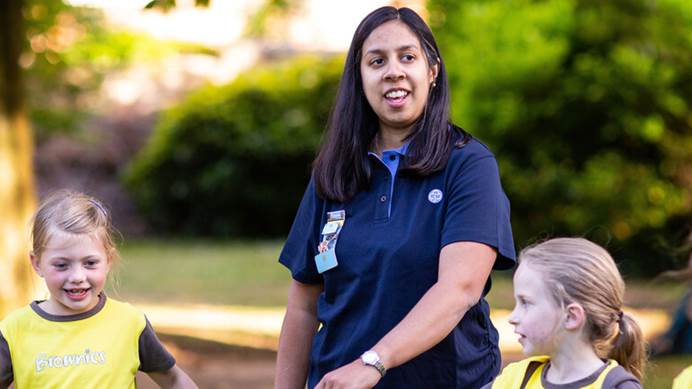Get thinking about inclusive food this Veganuary
This Veganuary, we take a look at different diets that members might have
Veganuary is an annual challenge encouraging people to try a vegan lifestyle in January.
Some of your members might be giving it a go and some members might be vegan all year round.
Veganism and vegetarianism
Being vegan means avoiding all animal-based products. As well as meat, this also includes products that come from animals, like milk, eggs and honey. It’s different to being vegetarian, which is avoiding just meat and fish. Members might be vegan or vegetarian for a range of reasons, but it’s important to make sure everyone feels included in unit meetings, so we’ve put together some ideas for easy vegan swaps. Make sure to check for allergies beforehand.
Vegan swaps
Bananas instead of eggs
If your unit is baking and there are vegan members, you’ll need to substitute the eggs (and butter, but you can use margarine). Eggs bind all the ingredients together and there are lots of vegan alternatives, but one of the cheapest and easiest options is to use one banana for every egg that would have been used. Mash up the banana and add it in when the recipe says to add in eggs.
Sweets
Did you know that lots of sweets are vegan? Squishy sweets often contain gelatine, which comes from animals, but hard sweets are normally vegan and vegetarian. Many brands also have made vegetarian versions of sweets.
Dark chocolate
Dark chocolate is often vegan (again, be sure to check the label because sometimes it can still contain milk) and can be used instead of milk chocolate. There are also vegan milk chocolate alternatives, but dark chocolate is normally a cheaper option.
Nice cream
This activity needs extra preparation before a unit meeting or try it at home instead.
To make nice cream, you’ll need to start with a banana per person. Peel and chop them into rough chunks or slices and place in a freezer-proof container and freeze them for at least eight hours. When the bananas are completely solid, put them in a food processor and blitz on a high speed for a few minutes (you might need to add a few tablespoons of water or a milk alternative to help the bananas break down and blend together). Serve it immediately for a yummy treat or mix with other flavours to make different types of nice cream. You could add berries, tropical fruits, or dark chocolate chips.
More foods are vegan than you might think!
Lots of carbohydrates like crisps and bread are vegan, and there are lots of surprising vegan foods too. Did you know bourbon biscuits are completely vegan?
Combine the programme with food swaps
Take this activity even further and earn a badge. The Feel good skills builder has lots of ideas you could incorporate. Try out Food for thought in Stage 1 and Stage 3’s Build it with food is all about the different nutrients we all need. In Stage 4’s Chop chop you can investigating swapping food in meals for healthy substitutes and as part of Stage 5 use brightly coloured fruit and veg in Rainbowls.
Members could take Veganuary out of the meeting place too with interest badges. The Rainbows Fruit and veg badge encourages members to find out about the hidden fruit and vegetables in their food and try something new. Brownies could have a go at vegan baking as part of the Baking badge. Guides could explore the world of vegan drinks in their Mixology badge. Rangers can try the Cooking badge, changing up their favourite dishes and building their cooking repertoire.
Dietary choices should be someone’s personal decision. But it’s important to remember that a young person’s diet choice of diet might be down to more than their beliefs and preferences. Things like money, allergies and living circumstances might mean that a young person can't eat the food they might want to.
Never tell a young member the way that they eat or what they eat is wrong or unhealthy, unless you're a professional. We can empower young people to choose for themselves to eat healthier and to understand what their body needs, but not make them feel negative about their way of eating.
If you think there could be a safeguarding concern, follow the advice in A Safe Space.
Other diets to think about
Kosher food
Jewish people eat according to the kosher rules found within the Torah, the Jewish book of sacred texts. There are three main kosher food categories, meat (fleishig), dairy (milchig) and pareve, which is any food that is not meat or dairy, such as fish, eggs, and plant-based foods.
These kosher traditions might affect how you run a food-based activity in a unit meeting. Some useful things to remember if you have Jewish members and are planning an activity around food is that any food categorized as meat (fleishig) must never be served or eaten at the same meal as dairy (milchig).
Also, meat eaten by Jewish people has to be kosher and prepared in a particular way. Jewish people don’t eat meat from pigs, rabbits, camels, kangaroos, or horses, scavenger birds and certain cuts of beef and fish is only considered kosher if it comes from an animal that has fins and scales. Most other foods are kosher unless they’ve been prepared in a non-kosher way.
Lots of foods have labels on them which specify if they are kosher or not, and there is lots of advice online about kosher traditions and there is even a website where you can search for different foods to find out if Jewish members can eat it. Read more about kosher traditions.
Halal food
In general, every food is considered halal in Islam unless it is specially prohibited by the Qur’an or the Hadith. Food that isn’t halal is called haram. Foods you might use in a unit meeting that can’t be eaten by Muslim members include lard, anything that comes from pigs (like bacon or ham), meat-based broths and stocks, gelatine and carnivorous animals. This isn’t a full list, so be sure to check before a food-based activity what might not be halal.
Like kosher foods, lots of halal products are clearly marked and there is lots of advice online. Read more about halal diets.
Other diets
As well as religious diets, vegetarianism and veganism, members could also have certain foods they can’t eat because, for example, they’re allergic. This should be made aware to you by young member’s parent or carer.
Some common dietary requirements include being gluten-free, lactose intolerant and dairy-free. Most supermarkets have a ‘free from’ section and affordable substitutes for lots of dietary requirements other than just veganism and vegetarianism. You’ll find everything from gluten-free biscuits to lactose-free milk and dairy-free cream.



